No Income Verification Mortgages in New Jersey: Unlocking Homeownership Possibilities
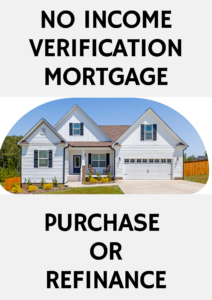
Introduction
For many aspiring homeowners in New Jersey, the dream of buying a house can be hindered by the challenges of traditional mortgage requirements. Self-employed professionals, freelancers, and small business owners often face difficulties in providing the necessary income verification documentation. However, there is good news for these individuals! “No-Income Verification” mortgages, also known as “stated-income” or “alt-doc” loans, have emerged as an innovative solution to this problem. In this article, we will delve into the world of “No-Income Verification” mortgages in New Jersey, exploring the benefits they offer and guiding you through the process of finding the right fit for your homeownership journey.
Understanding “No Income Verification” Mortgages
Purchasing a home is a significant milestone in many people’s lives, but the traditional mortgage application process can be challenging for those with unconventional income sources. “No Income Verification” mortgages have emerged as a solution to this issue, offering an alternative approach to assess creditworthiness without the need for standard income documentation like pay stubs and tax returns. We will dive into the concept of “No Income Verification” mortgages, exploring how they work, who can benefit from them, and the potential advantages and disadvantages they offer.
What are “No Income Verification” Mortgages?
“No Income Verification” mortgages, also known as “stated-income” or “alt-doc” loans, are home loans that allow borrowers to apply without providing the usual income verification documents required by traditional lenders. Instead, these mortgages rely on other factors, such as credit scores, employment history, and assets, to assess the applicant’s creditworthiness and determine eligibility.
How Do “No Income Verification” Mortgages Work?
The application process for a “No Income Verification” mortgage differs from conventional mortgages. While borrowers still need to provide identification and other relevant documentation, they are not required to submit income-related paperwork. Lenders use other means to evaluate the applicant’s ability to repay the loan, making it an attractive option for individuals with irregular income streams or those who struggle with the traditional income verification process.
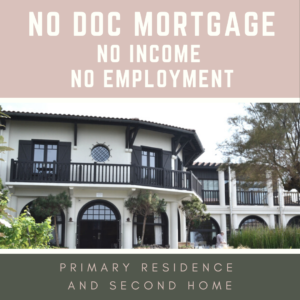
The Significance of “No Income Verification” Mortgages in New Jersey
The real estate market in New Jersey, like many other states, is diverse and dynamic, reflecting the changing landscape of the modern workforce. As the gig economy thrives and self-employment becomes more prevalent, traditional income verification processes can present obstacles for individuals seeking to buy homes. This is where “No Income Verification” mortgages play a significant role, offering a vital solution for those with unconventional income sources. Let’s explore the significance of “No Income Verification” mortgages in New Jersey and how they are transforming the homeownership journey for many residents.
Embracing New Jersey’s Evolving Workforce
New Jersey is home to a diverse and dynamic workforce, comprising individuals from various industries and occupations. The rise of freelancing, gig work, and entrepreneurship has reshaped the employment landscape, challenging the traditional notion of steady and predictable income streams. Many individuals in New Jersey generate income from multiple sources or have irregular earnings, making it challenging to meet the stringent income verification requirements set by traditional mortgage lenders.
A Lifeline for the Self-Employed and Freelancers
For self-employed professionals and freelancers in New Jersey, obtaining a mortgage through traditional means can be a daunting task. These individuals may lack standard income documentation, such as regular pay stubs, as their earnings fluctuate based on project-based work or contract gigs. “No Income Verification” mortgages recognize the financial stability of self-employed individuals beyond their traditional income, allowing them to present a more comprehensive picture of their financial health.
Supporting Small Business Owners
Small business owners in New Jersey often reinvest their profits into business growth, affecting their personal income documentation. “No Income Verification” mortgages acknowledge that these entrepreneurs may have substantial assets and financial resources, even if their formal income documentation appears less conventional. By considering their overall financial standing, small business owners have a better chance of securing a mortgage to invest in their dream home.
Encouraging Homeownership for Retirees
Even in retirement, many individuals in New Jersey may have unconventional income sources, such as pension plans, investment returns, or rental income. Traditional lenders may overlook these income streams, making it challenging for retirees to meet income verification criteria. “No Income Verification” mortgages consider these non-traditional sources of income, enabling retirees to access financing options and enjoy homeownership in their golden years.
Unlocking Opportunities for New Jersey Residents
The significance of “No Income Verification” mortgages in New Jersey lies in their ability to open doors to homeownership for a more extensive and diverse group of residents. They create opportunities for individuals who may have been excluded from the housing market due to rigid income verification standards. By focusing on factors beyond traditional income, “No Income Verification” mortgages provide a more inclusive and accessible pathway to owning a home.
Ensuring Responsible Borrowing
While “No Income Verification” mortgages offer flexibility, it is essential for borrowers to approach them responsibly. Homebuyers must carefully evaluate their financial capabilities, set realistic budgets, and avoid overborrowing. By doing so, borrowers can ensure they can comfortably manage their mortgage payments and enjoy the long-term benefits of homeownership.
CALL 888-958-5382 or APPLY NOW!!
Pros and Cons of “No Income Verification” Mortgages
No Income Verification” mortgages, also known as “stated-income” or “alt-doc” loans, offer an alternative approach to traditional mortgage lending by not requiring borrowers to provide standard income documentation. While these mortgages provide flexibility and accessibility for individuals with unconventional income sources, they also come with their own set of advantages and disadvantages. Let’s delve into the pros and cons of “No Income Verification” mortgages to understand their impact on borrowers and the housing market.
Pros:
- Streamlined Application Process: One of the significant benefits of “No Income Verification” mortgages is the simplified application process. Without the need to provide extensive income documentation, borrowers can complete the mortgage application more efficiently, reducing paperwork and processing time.
- Accessibility for Self-Employed and Freelancers: “No Income Verification” mortgages cater to self-employed professionals, freelancers, and gig workers who may face challenges in presenting regular pay stubs or tax returns. These borrowers can showcase their overall financial health, including assets and credit history, to demonstrate creditworthiness.
- Flexible Eligibility Criteria: Unlike traditional mortgages that heavily rely on income verification, “No Income Verification” mortgages consider various factors, such as credit scores, employment history, and reserves. This flexibility opens homeownership opportunities for individuals who may not meet the stringent income requirements of traditional lenders.
- Investment Property Financing: “No Income Verification” mortgages can be used to finance investment properties, making them an attractive option for real estate investors who generate income from rental properties.
- Business Expense Deduction: For self-employed borrowers, “No Income Verification” mortgages allow them to deduct their mortgage interest as a business expense on their tax returns, potentially resulting in tax advantages.
Cons:
- Higher Interest Rates: As “No Income Verification” mortgages present a higher risk for lenders due to the lack of income verification, borrowers may encounter higher interest rates compared to traditional mortgages.
- Limited Loan Options: Not all lenders offer “No Income Verification” mortgages, which could restrict borrowers’ choices. Consequently, borrowers may have to search more extensively to find lenders providing these alternative financing options.
- Potential for Overborrowing: Without the strict income scrutiny, borrowers might be tempted to overestimate their repayment capacity. This can lead to financial strain if they borrow more than they can comfortably afford to repay.
- Risk of Misrepresentation: Some borrowers may misrepresent their income intentionally or unintentionally, which can lead to loan default and legal consequences. This risk is mitigated through thorough lender evaluation and verification processes.
- Market Instability: The availability of “No Income Verification” mortgages can contribute to market instability in certain situations. During economic downturns, borrowers with higher-risk loans may be more susceptible to default, impacting the housing market.

Eligibility and Requirements for “No Income Verification” Mortgages in New Jersey
No Income Verification” mortgages provide an alternative financing option for individuals with unconventional income sources in New Jersey. While these mortgages offer greater flexibility, lenders still have specific eligibility criteria and requirements to mitigate risk. Let’s explore the key factors that borrowers should consider when seeking a “No Income Verification” mortgage in the Garden State.
Minimum Credit Score:
To qualify for a “No Income Verification” mortgage, borrowers typically need a solid credit score. While the exact credit score requirement varies among lenders, having a higher credit score enhances the borrower’s chances of securing favorable loan terms and interest rates. Lenders use credit scores to assess the applicant’s creditworthiness and determine their ability to manage debt responsibly. With Mortgage-World.com, a minimum credit score of 680 is required.
Loan-to-Value Ratio:
Lenders may impose specific loan-to-value (LTV) ratio limits on “No Income Verification” mortgages. The LTV ratio is the loan amount as a percentage of the property’s appraised value. A lower LTV ratio indicates a smaller loan relative to the property’s value, which can reduce the lender’s risk. Generally, a lower LTV ratio may lead to more favorable loan terms and interest rates.
Reserve Funds:
Borrowers may need to demonstrate sufficient cash reserves to cover mortgage payments. Lenders often require borrowers to maintain a certain number of months’ worth of mortgage payments in reserve as a safety net. Adequate reserves provide lenders with confidence in the borrower’s ability to handle unexpected financial challenges.
Proof of Employment or Business Ownership:
Although income documentation is not necessary for “No Income Verification” mortgages, lenders may still request evidence of employment or ownership. This step helps lenders verify the applicant’s overall financial stability and assess the reliability of their income sources. Borrowers may need to provide documentation, such as business licenses, contracts, or other proof of self-employment or freelance work.
Debt-to-Income (DTI) Ratio:
While “No Income Verification” mortgages do not consider traditional income, lenders may still evaluate the borrower’s debt-to-income (DTI) ratio. The DTI ratio compares the borrower’s total monthly debt payments to their gross monthly income. A lower DTI ratio signifies a lower level of debt relative to income, which can strengthen the borrower’s creditworthiness.
Other Financial Documentation:
Though not related to income verification, borrowers will still need to provide other standard documentation, such as identification, bank statements, and employment history. These documents assist lenders in understanding the borrower’s financial background and assessing their overall ability to manage the mortgage.
A Word of Caution
While “No Income Verification” mortgages can be a valuable option for some borrowers, it is essential to approach them responsibly. Borrowers should avoid overestimating their borrowing capacity and carefully assess their financial situation to ensure they can comfortably manage their mortgage payments. Responsible borrowing is critical to long-term financial stability and successful homeownership.
CALL 888-958-5382 or APPLY NOW!!
Finding “No Income Verification” Mortgage Lenders in New Jersey
If you are a self-employed professional, freelancer, or individual with unconventional income sources in New Jersey, finding a lender offering “No Income Verification” mortgages is essential to explore homeownership opportunities. While not all traditional lenders provide this alternative financing option, several strategies can help you connect with lenders willing to consider your overall financial health rather than just traditional income documentation. Let’s explore some effective methods to find “No Income Verification” mortgage lenders in the Garden State.
1. Online Research:
The internet is a valuable resource for researching lenders that specialize in “No Income Verification” mortgages. Look for online platforms, websites, and forums that discuss alternative financing options. Many lenders openly advertise their ability to cater to self-employed and unconventional borrowers.
2. Local Mortgage Brokers:
Reach out to local mortgage brokers in New Jersey who have experience in the real estate market and are well-connected with various lenders. Mortgage brokers often have access to a wide network of lenders and can connect you with those offering “No Income Verification” mortgages.
3. Networking:
Seek recommendations from friends, family, or colleagues who have successfully obtained “No Income Verification” mortgages. Personal referrals can provide valuable insights into lenders who are willing to work with borrowers with unconventional income sources.
4. Alternative Financing Institutions:
Explore the services of alternative financing institutions that specialize in catering to individuals with unconventional income. These institutions may have more lenient eligibility criteria and offer “No Income Verification” mortgages to a wider range of borrowers.
5. Attend Real Estate and Mortgage Seminars:
Keep an eye out for real estate and mortgage seminars and workshops in New Jersey. These events often host mortgage lenders who may be open to providing “No Income Verification” mortgages. Networking at such events can also be beneficial in your search for suitable lenders.
6. Online Mortgage Marketplaces:
Consider using online mortgage marketplaces where borrowers can connect with multiple lenders. Some of these platforms allow borrowers to specify their unique income situations, helping them find lenders who offer “No Income Verification” mortgages.
7. Seek Assistance from Real Estate Agents:
Work with experienced real estate agents who are familiar with the local market and have dealt with unconventional borrowers in the past. They may have insights into lenders who have previously provided “No Income Verification” mortgages to their clients.
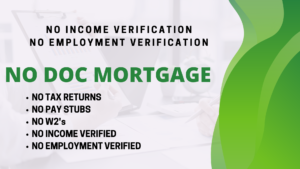
The Application Process for “No Income Verification” Mortgages
Applying for a “No Income Verification” mortgage follows a different approach compared to traditional mortgage applications. As these mortgages focus on factors beyond standard income documentation, the application process is streamlined and tailored to accommodate individuals with unconventional income sources. If you are considering a “No Income Verification” mortgage in New Jersey, here’s a step-by-step guide to help you navigate the application process.
1. Preparation:
Gather essential documentation that lenders will require during the application process. While “No Income Verification” mortgages do not necessitate income documentation, you will still need to provide identification, bank statements, employment history, and other financial records. Having these documents ready will expedite the application.
2. Credit Check:
Lenders will conduct a credit check to evaluate your creditworthiness. A solid credit score can compensate for the lack of traditional income documentation. Review your credit report beforehand to ensure its accuracy and address any discrepancies that could affect your application.
3. Lender Evaluation:
During this stage, the lender will review your application, focusing on factors like your credit history, assets, reserves, and employment details. Your overall financial health will be under scrutiny to assess your ability to manage debt responsibly.
4. Offer Comparison:
Once you receive offers from different lenders, take the time to compare them carefully. Look beyond the interest rate and consider other terms, such as loan duration, fees, and prepayment penalties. Choose the offer that best aligns with your financial goals and capabilities.
5. Property Appraisal and Inspection:
As with any mortgage, “No Income Verification” mortgages require a property appraisal and inspection to determine the property’s value and condition. The lender will arrange for a licensed appraiser and inspector to assess the property’s worth and ensure it meets safety standards.
6. Title Search and Insurance:
The lender will conduct a title search to confirm the property’s ownership and ensure there are no existing liens or legal issues. Additionally, you will need to obtain title insurance to protect your ownership rights in case of any unforeseen title disputes.
7. Closing Process:
Once all the necessary evaluations and checks are complete, you will proceed to the closing process. During the closing, you and the seller (or their representative) will sign the final loan documents, and the funds will be disbursed. This final step completes the purchase, and you become the official homeowner.
Tips for a Smooth Application Process:
- Be Transparent and Honest: Provide accurate and transparent information throughout the application process to build trust with the lender.
- Organize Your Financial Records: Having all necessary documentation ready will facilitate a smoother application process.
- Communicate with the Lender: If you have any questions or concerns, don’t hesitate to communicate with the lender to ensure a clear understanding of the process.
- Choose a Reputable Lender: Select a lender with experience in “No Income Verification” mortgages and a track record of working with unconventional borrowers.
CALL 888-958-5382 or APPLY NOW!!
Tips for Responsible Borrowing with “No Income Verification” Mortgages
While “No Income Verification” mortgages offer greater flexibility and accessibility for individuals with unconventional income sources, responsible borrowing is crucial to ensure a successful and sustainable homeownership journey. To make the most of this alternative financing option and avoid financial pitfalls, consider the following tips for responsible borrowing:
1. Set a Realistic Budget:
Before applying for a “No Income Verification” mortgage, carefully evaluate your finances and set a realistic budget. Consider all your monthly expenses, including mortgage payments, property taxes, insurance, utilities, and maintenance costs. Avoid borrowing more than you can comfortably afford to repay each month.
2. Save for a Down Payment:
While “No Income Verification” mortgages may require a smaller down payment compared to traditional mortgages, having a significant down payment can still benefit you. A larger down payment reduces the loan amount, potentially leading to lower monthly payments and better loan terms.
3. Build Your Credit Score:
A strong credit score can have a significant impact on your mortgage terms, including interest rates. Pay your bills on time, manage your debts responsibly, and avoid opening new lines of credit unnecessarily. Improving your credit score can help you qualify for more favorable loan terms.
4. Emergency Savings:
Maintain an emergency fund to cover unexpected expenses, such as repairs or medical emergencies. An emergency fund provides financial security and ensures you can continue to meet your mortgage obligations, even during challenging times.
5. Limit Debt:
While “No Income Verification” mortgages may not consider your traditional income, excessive debt can still impact your financial stability. Minimize other outstanding debts, such as credit card balances and personal loans, to improve your overall financial health.
6. Seek Professional Financial Advice:
Consult with a financial advisor or mortgage professional to gain a comprehensive understanding of your financial situation and borrowing capacity. A professional can provide personalized guidance and help you make informed decisions.
7. Research Lenders Thoroughly:
When choosing a lender, conduct thorough research and read reviews from other borrowers. Select a lender with a track record of working with unconventional borrowers and offering competitive terms.
8. Avoid Overestimating Income:
Resist the temptation to overstate your income or financial resources during the application process. Providing accurate information is essential for building trust with the lender and ensuring a sustainable mortgage arrangement.
9. Consider Future Income Stability:
Even without traditional income verification, evaluate the stability of your income sources. Consider factors such as the demand for your services, industry trends, and potential fluctuations in your earnings. Ensure your income can support your mortgage payments in the long term.
10. Plan for the Future:
Anticipate future life changes and their potential impact on your finances. Consider factors such as starting a family, career shifts, or significant expenses. Being proactive in your financial planning can help you adapt to changes and maintain homeownership successfully.
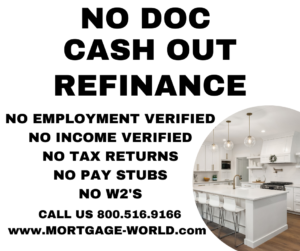
The Future of “No Income Verification” Mortgages
The landscape of mortgage lending continues to evolve, driven by changing demographics, advancements in technology, and shifts in the modern workforce. “No Income Verification” mortgages have emerged as an innovative solution to address the needs of individuals with unconventional income sources. As we look to the future, several key trends and developments are likely to shape the trajectory of “No Income Verification” mortgages.
1. Increased Acceptance and Accessibility:
As the gig economy and self-employment continue to grow, the demand for “No Income Verification” mortgages is expected to increase. Lenders are likely to embrace this financing option further and expand their offerings to cater to a more diverse range of borrowers with unconventional income sources.
2. Advanced Alternative Verification Methods:
Advancements in technology will pave the way for more sophisticated alternative verification methods. Instead of solely relying on traditional credit scores, lenders may leverage artificial intelligence and big data analytics to assess borrowers’ financial health comprehensively. This will lead to a more accurate evaluation of creditworthiness, even without traditional income documentation.
3. Focus on Financial Education:
To promote responsible borrowing, there will be a greater emphasis on financial education for potential “No Income Verification” mortgage applicants. Borrowers will be encouraged to understand their financial situations thoroughly, set realistic budgets, and make informed decisions about homeownership.
4. Integration of Open Banking:
Open banking initiatives will likely play a role in the future of “No Income Verification” mortgages. By allowing borrowers to share financial data securely with lenders, open banking can streamline the application process and provide lenders with real-time insights into the borrower’s financial health.
5. Market Regulation and Risk Mitigation:
As the popularity of “No Income Verification” mortgages grows, regulatory bodies may focus on ensuring responsible lending practices. Stricter guidelines and risk mitigation measures could be implemented to protect both borrowers and lenders from potential financial challenges.
6. Alternative Credit Scoring Models:
Traditional credit scoring models may be augmented or replaced by alternative credit scoring models that consider a broader range of factors, such as rental payment history, utility bill payments, and other non-traditional data. This will further enhance the accuracy of credit assessments for unconventional borrowers.
7. Integration of Non-Bank Lenders:
Non-bank lenders, including fintech companies and alternative financing institutions, are likely to play a more prominent role in providing “No Income Verification” mortgages. Their ability to adapt quickly and leverage technology can offer competitive advantages in this evolving market.
8. Data Privacy and Security:
As lenders collect and analyze more financial data, data privacy and security will become paramount. The industry will focus on ensuring robust security measures to protect borrowers’ sensitive information.
9. Integration of Cryptocurrency and Digital Assets:
As digital assets and cryptocurrencies gain mainstream acceptance, some lenders may explore innovative ways to use these assets as alternative forms of collateral or for verifying financial stability.
10. Diverse Product Offerings:
In the future, “No Income Verification” mortgages may evolve to offer more diverse product offerings, catering to different segments of unconventional borrowers. This could include tailored mortgage options for freelancers, gig workers, and entrepreneurs.
CALL 888-958-5382 or APPLY NOW!!
Conclusion
“No-Income Verification” mortgages have opened doors to homeownership for many New Jersey residents, offering flexibility and accessibility for those with unconventional income sources. However, borrowers must approach these mortgages responsibly, ensuring they can manage their monthly payments comfortably. By understanding the eligibility requirements and considering the pros and cons, potential homeowners can make informed decisions and embark on a successful homeownership journey.
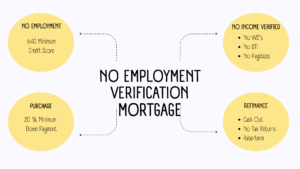
FAQs
-
Can I qualify for a “No Income Verification” mortgage with a lower credit score?
- While it may be more challenging, some lenders offer these mortgages to borrowers with slightly lower credit scores. However, higher interest rates may apply.
-
Can I use a “No Income Verification” mortgage for an investment property?
- Yes, these mortgages can be used for various property types, including primary residences, second homes, and investment properties.
-
Is it possible to refinance a “No Income Verification” mortgage in New Jersey?
- Yes, if you already have a “No-Income Verification” mortgage, refinancing may be an option, depending on lender policies and your financial situation.
-
How do I avoid overborrowing with a “No Income Verification” mortgage?
- Carefully assess your financial situation, set a realistic budget, and avoid borrowing beyond your means to ensure manageable monthly payments.
-
Can “No Income Verification” mortgages help freelancers with fluctuating income?
- Yes, these mortgages are designed to accommodate those with irregular income streams, making them suitable for freelancers and self-employed individuals.
CALL 888-958-5382 or APPLY NOW!!

Mortgage-World.com
Comments are closed.